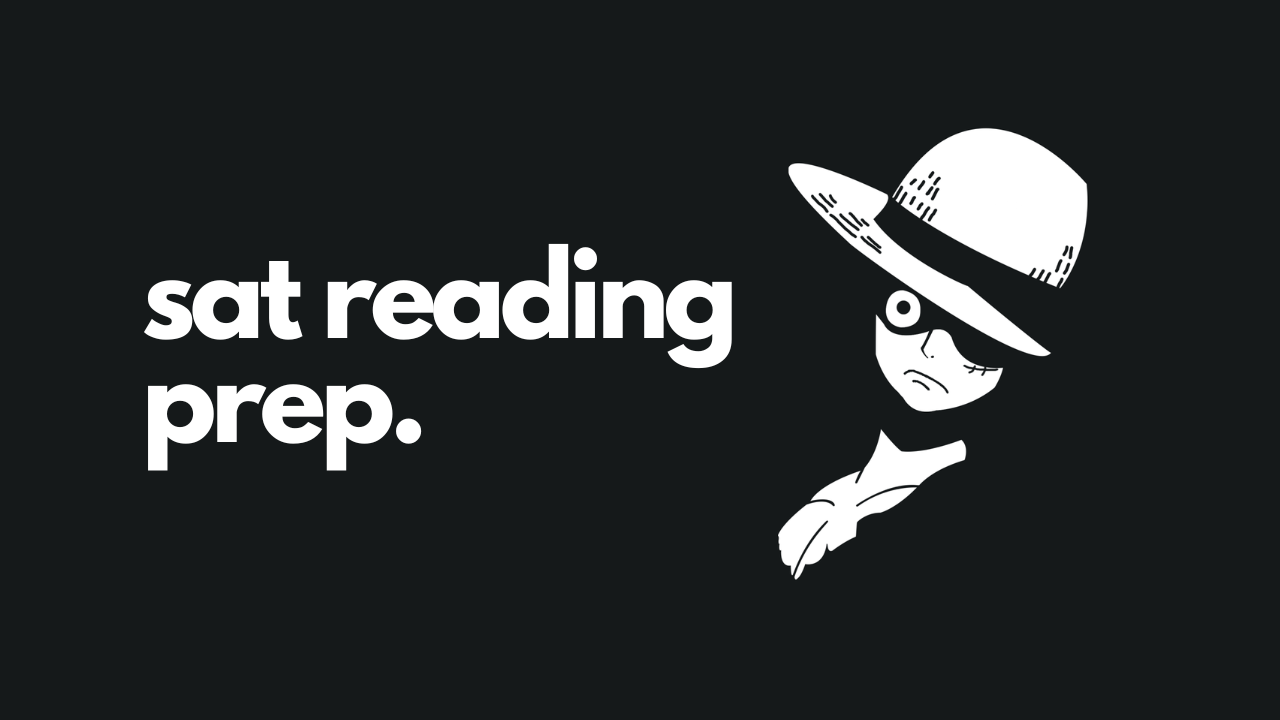
#
SAT Reading Prep
Some materials that will help in preparing for the reading section of SAT. ㅤㅤㅤㅤㅤㅤㅤㅤㅤ
This guide was meant for the traditional SAT exam aka the one we have been giving until 2022. Since digital SAT is a thing now, I'm not sure what the new pattern is, but I'm sure these will definitely help improve your comprehension as well as overall English skill. So, regardless of which SAT you're taking these resources should prove themselves helpful.
#
Suggested Reading
- New York Times: www.nytimes.com (particularly the Science section)
- Economist: www.economist.com
- Scientific American: www.scientificamerican.com
- National Geographic: www.nationalgeographic.com
- Newsweek: www.newsweek.com
- Time Magazine: www.time.com
- Smithsonian Magazine: www.smithsonianmag.com
- The Atlantic Monthly: www.theatlantic.com/magazine
- Wired: www.wired.com
For links to many additional resources
- Arts & Letters Daily: www.aldaily.com
Historical Documents, Sources:
Also see: Gerald Graff, Cathy Birkenstein, and Russell Durst: Tiley Say/I Say: The Moves that Matter in Academic Writing, 2nd Edition. New York: W.W. Norton and Company, 2009.
Fiction, suggested authors: Julia Alvarez, Jane Austen, Charlotte/ Anne Bronte, Michael Chabon, Charles Dickens, Jhumpa Lahiri, Toni Morrison, George Orwell, Edith Wharton
Science and Social Science Authors: Daniel Kahneman, Malcolm Gladwell, Adam Grant, Daniel Levitin, Brian Greene, Stephen Hawking, Lisa Randall
Note: If you are seeking additional resources for graphic-based questions, you may want to work with Science sections from released ACTs. Although somewhat more challenging than SAT data analysis questions overall, they nevertheless require many of the same skills tested on the SAT. In addition to the tests in 77ze Official ACT Prep Guide, several more authentic exams are available online.
#
Key Historical Movements and Figures:
- The Revolutionary Period:
Benjamin Franklin, Thomas Jefferson, John Adams, Alexander Hamilton
- The Abolitionist Movement:
Frederick Douglass, William Lloyd Garrison, Herny Ward Beecher, Harriet Beecher Stowe
- Transcendentalism:
Ralph Waldo Emerson, Henry David Thoreau
- The Civil War:
Abraham Lincoln, Stephen Douglass, Daniel Webster
- The Women's Rights Movement:
Susan B. Anthony, Elizabeth Cady Stanton, Lucretia Mott, Angelina and Sarah Grimke (also active in the Abolitionist Movement)
- The Progressive Movement and Muckrakers:
Upton Sinclair, Jane Addams, Ida Tarbell, Jacob Riis, WEB DuBois, Booker T. Washington
- World Wars I and II:
Woodrow Wilson (WWI), Franklin D. Roosevelt (WWII)
- The Civil Rights Movement:
Martin Luther King, Jr., Malcolm X, Fannie Lou Hamer, John F. Kennedy
#
Some Important Passage Readings:
Example: Official SAT Test 4, Edmund Burke and Thomas Paine Suggested Readings:
- Edmund Burke: Reflections on the Revolution in France
- Thomas Paine: Common Sense, The Rights of Man, Age of Reason
Example: Official SAT Test 2, Elizabeth Cady Stanton and Official SAT Test 3, Mary Wollstonecraft Suggested Readings:
- Elizabeth Stanton: History of Woman Suffrage
- Mary Wollstonecraft: A vindication of the rights of men, in a letter to the Right Honourable Edmund Burke
- Mary Wollstonecraft: Maria The Wrongs of Woman
Example: Official SAT Test 1, Virginia Woolf + PSAT, Frederick Douglas Suggested Readings:
- Catherine Beecher: An Essay on Slavery and Abolitionism
- Angelina Grimke: Letters to Catherine E. Beecher
Example: Official SAT Test 6, Abe Lincoln and Henry David Thoreau Suggested Readings:
- Abe Lincoln Writings
- Henry David Thoreau: Civil Disobedience
- Alexis de Tocqueville: Democracy in America
Example: Official SAT Test 8, Abe Lincoln and Stephen Douglas Suggested Readings:
- Abe Lincoln
- The Declaration of Independence
